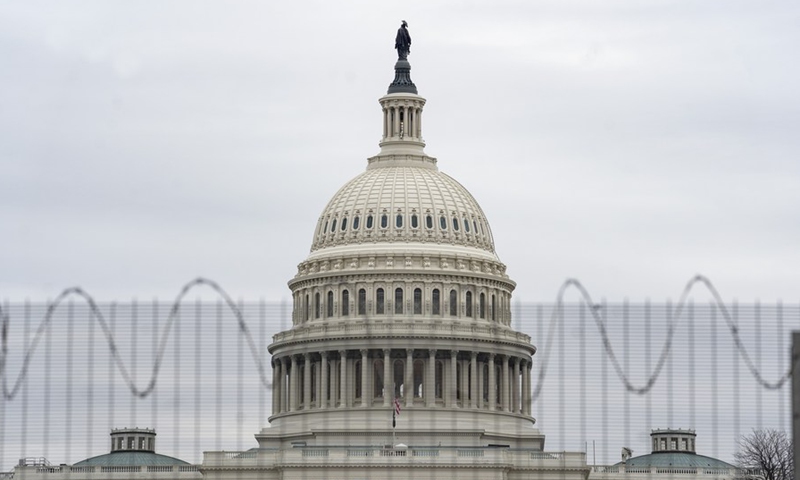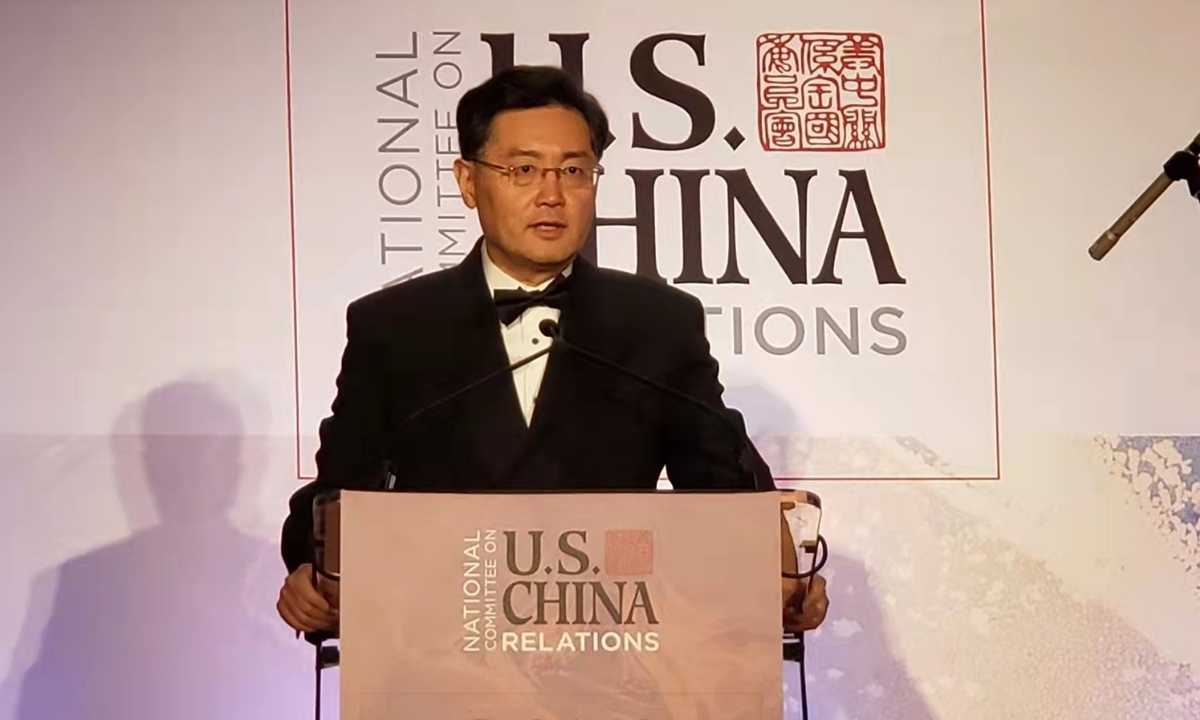US ‘whole-of-govt’ animosity against China building up with Blinken's upcoming speech
US Secretary of State Antony Blinken will detail a national security strategy in the coming weeks to deal with the emergence of China as a great power, which will contribute to the US' latest "whole-of-government" propaganda of the "China threat," jointly hyped by the government and lawmakers, along with think tanks and media.
Observers said Blinken's upcoming address won't be something new but rather seeks to demonstrate the US' ability to manage foreign affairs in Europe and the Asia-Pacific at a time when the Ukraine crisis continues.
But when the all-out animosity against China reaches a new high, a US too obsessed with "China threat" is losing its capability of analyzing China in a nuanced manner, silencing domestic rational voices and risking military conflict with China over the island of Taiwan.
Blinken said at a Senate Foreign Relations Committee hearing on Tuesday that he would speak publicly and in detail about the strategy.
He said before the Senate appearance that China is paying a reputational cost for sitting on the fence and even possibly falling on the Russian side.
Lü Xiang, a research fellow at the Chinese Academy of Social Sciences, told the Global Times on Thursday that the international community will pay attention to whether the US will adjust its trade policies with China and how it keeps a balance between the traditional transatlantic alliance and its "Indo-Pacific Strategy" ambition against the backdrop of the Russia-Ukraine conflict.
Blinken on Tuesday also mentioned a US delegation to the Solomon Islands, with which China just signed a security pact. US President Joe Biden is expected to host a US-ASEAN summit in mid-May and visit South Korea and Japan following that, according to the US News.
Experts noted that Blinken's upcoming speech may try to link the Russia-Ukraine conflict with US strategy on China and further coordinate the different mechanisms in its "Indo-Pacific Strategy," including QUAD and AUKUS, to show US presence in the region will not decrease despite the Ukraine crisis.
A Beijing-based international relations expert who asked not to be named said Blinken has a clear goal of manipulating the Ukraine crisis and diverting European countries' evaluation of relations with China.
The US has positioned China as a rival and will only cooperate when it has to, such as lowering certain tariffs to ease its domestic inflation, the expert said.
US Trade Representative Katherine Tai has restarted an exclusion process that could lower tariffs on some Chinese goods, but has made no major moves to remove tariffs on hundreds of billions of dollars worth of Chinese goods, Reuters reported.
But not long ago, on March 30, Tai, in her testimony before the House Ways and Means Committee, said that a good-faith effort to engage with China's government on trade may be hitting its limits and that existing tools aren't up to the task.
US Treasury Secretary Janet Yellen urged China to use its "special relationship with Russia" to persuade Russia to end military operations in Ukraine.

Photo taken on Jan 25, 2021 shows the US Capitol building in Washington, DC, the United States. Photo:Xinhua
Numerous bills targeting China have been approved and anti-China draft acts are piling up in the US Congress. Rational voices on China are now rarely heard from US think tanks, and the US doesn't hesitate to use its allies to amplify the anti-China propaganda. In an op-ed article recently published in the Los Angeles Times, former Japanese prime minister Shinzo Abe mentioned Taiwan and Ukraine in the same breath and said the time had come for the US to make clear that it would defend Taiwan.
Franz Gayl,a retired US Marine who served as an officer for 22 years, told the Global Times in a recent interview that US professional staff, all well-attuned to political winds and opportunities, summarize the issues in ways that provide political advantage to their principals.
In the process the national security establishment and its congressional overseers have been dumbed down to embrace a China-averse groupthink. This unbridled approach to managing contemporary US-China relations is fraught with deadly risks, Gayl said, noting the current (US) groupthink is hawkish on China's positions and policies on all matters.
The "whole-of-government" anti-China propaganda has an influence on public opinion, as Gallup's latest annual World Affairs poll showed the American public's opinion of China remains at a historic low.
The poll, conducted from February 1-17, found that 79 percent of respondents have an unfavorable view of China, with 41 percent answering "very unfavorable." It also found that Americans view China as a "critical" threat to US security.
The trade imbalance, COVID-19 pandemic, and the US-concocted lies of human rights violations in Xinjiang and Hong Kong regions, are frequent excuses the US uses to smear China, and contributed to a negative impression.
A basic consensus was developed in the US to perceive China as a challenge or threat prior to the Biden administration, yet the new administration is not actively trying to adjust the perception, Da Wei, director of the Center for International Security and Strategy of the Tsinghua University in Beijing, told the Global Times.
The US government and academia have been aggressive in their rhetoric toward China, all because of the US strategic consensus on China which has been formed and increasingly consolidated, Da said.
Describing the Trump presidency as creating a "war-time like" atmosphere, Da said that at the beginning of a war, there may be anti-war opinions on all sides, but after the bullet is fired and everyone's emotions get fierce, there will be less rational voices. The same is true between China and the US.
What we see today is that the US is equating China to Russia, two countries that have good relations but cannot be equated in any way, or repeatedly comparing the Ukraine issue with the Taiwan question, two issues that are not comparable at all. Once again, the US is losing its expertise and willingness to understand the nuances of international issues, leading to this very dangerous phenomenon, experts said.
The US is storing up trouble for the future because existing hostility will not be reversed in a snap even when the US ultimately realizes treating China as a rival doesn't work out, experts said.
In contrast, Chinese Ambassador to the US Qin Gang has been carrying out active exchanges with American society in order to offset a distorted understanding of China in the US, because "China sees bilateral ties in a completely different perspective and always seeks stable and constructive relations," Lü said.
China will try its best to de-escalate tensions on the condition that its bottom line is safeguarded. Such an attitude is a responsible and decent way in major power diplomacy and will be supported by the majority of the international community, he said.

Ambassador Qin Gang reads a letter on the 2021 Gala Dinner of the National Committee on US-China Relations on November 9, 2021. Photo: Website of Chinese Embassy in the US
Photos
Related Stories
- US chiefly responsible for Russia-Ukraine conflict
- "Test to treat" chaos latest setback for U.S. COVID-19 pandemic response: FT
- More than half of Americans have been infected with COVID-19: CDC
- Data failures, bureaucracy, politics hindered initial U.S. COVID-19 response: former government coordinator
- FBI director warns of consequences of U.S. crime spike: report
Copyright © 2022 People's Daily Online. All Rights Reserved.










